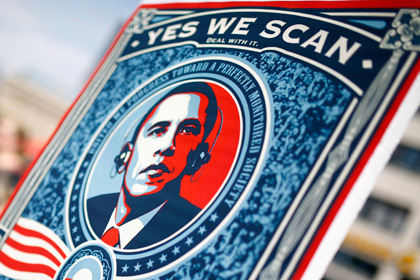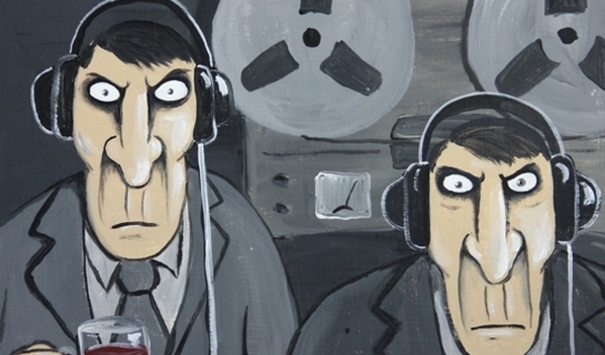A bit of optimism under the hood of total control
 Just a few years ago it seemed: who might need information about my private life, which I leave on the Internet? After all, most of the correspondence is a meaningless chatter, hardly of great value to the interlocutors, what can we say about the special services. And who is bad because Google knows almost everything about my tastes and preferences? Annoying, of course, getting half a lifetime of advertising diapers, once accidentally visiting the site about babies. But you can live.
Just a few years ago it seemed: who might need information about my private life, which I leave on the Internet? After all, most of the correspondence is a meaningless chatter, hardly of great value to the interlocutors, what can we say about the special services. And who is bad because Google knows almost everything about my tastes and preferences? Annoying, of course, getting half a lifetime of advertising diapers, once accidentally visiting the site about babies. But you can live.The problems of the "little man"
But gradually the picture somehow darkened. It turned out that not only world leaders can not write by e-mail or say anything personal on the phone. The average citizen should also be wary of too provocative statements - once his words, a photo, or simply the fact of visiting "undesirable" sites can play a cruel joke with him. Think about whether you would like to tell all your teenage interests to superiors, business partners or children?
For example, as soon as Elmira Abdrazakova won the title of First Beauty of Russia last year, her photos immediately surfaced, in which then still underage beauty was “caught” in a nightclub with a glass and a cigarette. For "violations of the sport mode" she was almost deprived of the crown. In addition, detractors attacked Elvira's accounts on social networks, and sprinkled her with mud for mixed Russian-Tatar origins. It is unlikely that the girl thought about the consequences, sharing information and photos on the network. But at least she herself posted information in social networks.
Elder brother is omnipresent
It is known that the 2008 law allows the NSA (US National Security Agency) to monitor reports related to terror. In the mid-2000s, the NSA established the PRISM program, which collects data from email, the Internet, and telephone communications from millions of users around the world. As the Washington Post says, the NSA records EVERY “unidentified” call from abroad. In addition, a scandal erupted not long ago: according to the Guardian , the NSA introduced chips that allow intercepting information from all routers that are collected in the USA and exported all over the world.
')
That is, the powers of the special services are not limited. And not only in America. In German Bavaria, hackers cracked a spy program created by the police. The application collected data from personal computers, including image, sound and text. Just an online search, and without a warrant and charges. After intervening in the Angela Markel scandal, it turned out that there were five viruses in the German police service. They illustrated mail and photographs, sent over 30,000 computer screenshots to the police, and had access to passwords and bank accounts of German citizens. What is the most unpleasant, all the collected information was also sent to servers in the USA.
"Chips" of war of special services with terrorists
In America, after the revelations of Snowden, public opinion was divided. One part of citizens is outraged by interference in their private life. In their understanding, freedom is precisely freedom, not a short leash from the special services. I want to go to doubtful sites - I go. It is only for me to decide when and how to protect my family and children from the corrupting influence - let the special services take care of their “stigma in a cannon”.
Especially, of course, the Europeans were outraged. Because they are not at all eager to share the confidentiality of their information with the American NSA, whatever their threat. And the verified data that the program for collecting metadata was protected from something was not found. Only hints. Another part of society is afraid of terror, the red plague, the brown contagion and everything else in the world, and is sure that “they will understand better at the top”, what needs to be checked, and also “there is no smoke without fire”. However, if at first the freedom-loving citizens were in the minority, then gradually their regiment arrives - as public awareness of the activities of the special services grows.
In July 2013, the Pew Research Center reported that most Americans are concerned that counter-terrorism measures violate their civil liberties. And in 2004, when such information began to be collected, a large part of the respondents were rather satisfied with how much the government was doing for their safety.
In addition, in 2014, the global press freedom index, which is calculated annually by the conservative organization Freedom House, plummeted in the United States. Yes, and President Obama, who actively criticizes restrictions on civil rights and freedom of speech around the world (in contrast to America - a stronghold of democracy), in fact, the media filed twice as many lawsuits in connection with the alleged leakage of classified information than all previous administrations combined.

So what to do?
Some states are trying to deal with "bad" network espionage by law. Thus, the Legal Committee of the House of Representatives of the US Congress supported the ban on mass wiretapping of Americans and the collection of telephone metadata from the NSA. If the document is approved, it will be possible for the secret services to listen to and use information from the databases only if there is a court order, and only as part of the ongoing investigation.
Russian lawmakers propose bills prohibiting the purchase of network equipment abroad, as well as the creation of their own “global local” network - for domestic use. And concerned about the problems of privacy, users prefer not to wait for help from above, but to use special software (Tor, I2P).
 We also make a program to anonymize Internet traffic , called Hola. According to the principle of operation, Hola is similar to Tor, but it is aimed at non-specialists — just a list of connections by country, and you can choose for which site which connection is used.
We also make a program to anonymize Internet traffic , called Hola. According to the principle of operation, Hola is similar to Tor, but it is aimed at non-specialists — just a list of connections by country, and you can choose for which site which connection is used.Our solution is not 100% "bulletproof", of course. Nor is Tor, in general, with “silver bullets” the situation is tense. Perhaps, it will benefit not a specific ideal algorithm or program, but diversification of solutions — the more ways of anonymization, the more difficult it is to compromise a significant part of users.
And what software do you use to protect your data from Big Brother? After all, there are exactly guys on Habré who are concerned about network privacy.
Source: https://habr.com/ru/post/222609/
All Articles